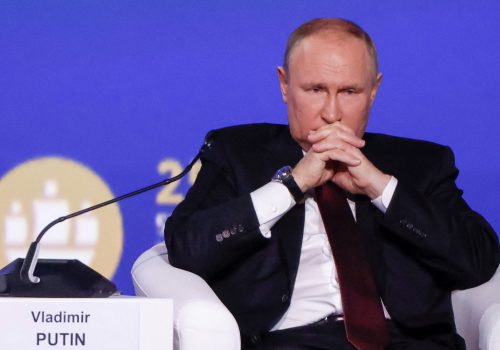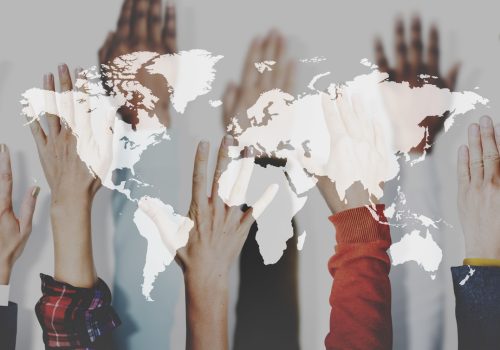Keeping everyone in the club: How sanctions complicate the Bretton Woods Institutions’ job
Economic sanctions pose a conundrum for the Bretton Woods Institutions (BWIs), which are meant to be open to all yet remain Western-dominated. The G7 and EU collectively control the majority of votes at the BWIs, giving them the ability to vote along their shared policy objectives. While sanctions are often clearly justified, they also put the International Monetary Fund and the World Bank – the institutions charged with international financial stability and development – in a complicated position. This is particularly controversial when BWIs deny emergency loans to heavily-sanctioned regimes, as in the cases of Iran and Venezuela at the onset of the pandemic.
Countries that perceive a risk of being subject to Western sanctions may begin disengaging from the institutions and turn to alternate partners in response. This would weaken the institutions’ effectiveness at economic global governance and diminish the ability of sanctioning countries to cut off lifelines to sanctioned states in the future.
Ad hoc protocols: Adherence to sanctions at the IMF and World Bank
The imposition of sanctions has expanded over time. Between 1950 and 2019, a total of 1,101 sanctions were introduced with an average duration of 6.3 years. The United States has accounted for more than 42% of all sanctions in place since 1950, followed by the EU at 12%. Economic sanctions accounted for more than half of all sanctions – 30% financial and 22% trade sanctions.
There is, however, no clear set of protocols regarding adherence to sanctions at the BWIs. The G7 and the EU together control 54.42% of all votes at the IMF and 52.48% at the World Bank. This Western-favoring voting structure, in combination with expanding sanctions designations, means the BWIs’ functions and services are frequently used as bargaining tools in attempts to apply economic pressure on target countries. By blocking sanctioned countries’ access to emergency financing, reserves, development programs, and technical assistance that the IMF and the World Bank provide, sanctioning countries intend to eliminate targeted countries’ economic and financial lifelines.
For instance, citing sanctions against Iran, the United States blocked Iran’s ability to receive a $5 billion emergency loan from the IMF in 2020. Similarly, the IMF rejected heavily-sanctioned Venezuela’s request for a $5 billion loan at the onset of the pandemic because there was “no clarity” over international recognition of the government. Following the Taliban’s 2021 takeover in Afghanistan and the imposition of US sanctions, the World Bank froze aid to the country and the IMF blocked Afghanistan from accessing emergency reserve funds. The World Bank also halted payments to projects in Myanmar in 2021 following a military coup and the imposition of US sanctions. Notably, the IMF gave Myanmar $350 million in emergency funding days before the military coup in February 2021 but later froze Myanmar’s access to IMF assets.
More recently, in response to Russia’s brutal invasion of Ukraine, the World Bank stopped all programs in Russia, and G7 officials walked out of a key part of the IMF spring meetings as the Russian official began to speak. While Russia does not have an IMF-supported program and has not borrowed from the IMF for decades, the newest sanctions packages make it more challenging for Russia to use its IMF Special Drawing Rights (SDRs). Russian Finance Minister Anton Siluanov has argued that these measures violated the principles of the Bretton Woods agreements that initially set up the IMF and the World Bank. Nevertheless, the Western allies’ voting power legally allows them to make decisions that Russia does not favor.
Special drawing rights remain cordoned off
Once sanctions are imposed with a commitment to squeezing assets, Special Drawing Rights (SDRs) – interest-bearing international reserve assets created by the IMF – become virtually a frozen asset. SDRs are not currencies in and of themselves, but they can be exchanged for “freely usable currencies” – the dollar, euro, yen, renminbi, and pound sterling. They are only available to regimes recognized internationally; governments in Afghanistan, Myanmar, and Venezuela were denied access to the country’s SDRs.
Converting SDRs to usable currencies following the imposition of sanctions is no easy task for countries like Iran and Russia, despite their regimes being internationally recognized. They could request a conversion through Voluntary Trading Arrangements (VTAs) wherein members volunteer currency reserves for exchange when requested or engage in bilateral agreements. However, any transactions with sanctioned central banks will be viewed as enabling sanctions evasion and strain ties with the sanctioning countries. No country is willing to ignore that risk.
The risk to economic global governance
The increasing prominence of international economic sanctions is placing the BWIs in a complicated position. They must operate within the constraints placed by the voting majority of the G7 and EU while also remaining credible to all their members and adhere to the core missions of the institutions. So far, there has been a high bar for the circumstances under which sanctions directly impact the programs of BWIs with regard to the sanctioned countries. This is mainly because sanctioning authorities have sought to build consensus among member states to abandon programs in sanctioned countries.
Nevertheless, non-Western countries that are worried about potentially losing access to the IMF and World Bank’s services due to Western sanctions may look for alternative institutions and mechanisms to insulate themselves from such a risk. They will seek to secure continued access to the emergency financing, technical assistance, and development financing that the BWIs currently provide that could be curtailed if Western sanctions were to be imposed. This could include engaging, to a limited yet increasing degree, with large state actors, regional multilateral banks, sovereign wealth funds, and even multinational corporations willing to provide those services. This would, in turn, weaken the BWIs’ mandate of global economic governance.
Despite these risks, imposing sanctions remains necessary to curtail the flow of resources to reprehensible regimes. Western actors should be aware of the associated risks and continue to involve the BWIs in the rarest of cases. While the IMF and World Bank are constrained by voting members with matters relating to sanctions adherence, they should shed light on the processes surrounding these decisions to manage the expectations of all stakeholders.
Mrugank Bhusari is a Program Assistant with the Atlantic Council GeoEconomics Center. @BhusariMrugank
Maia Nikoladze is a Program Assistant with the Economic Statecraft Initiative at the Atlantic Council GeoEconomics Center.
Amin Mohseni-Cheraghlou is a consultant with the GeoEconomics Center and an assistant professor of Economics at the American University in Washington, DC. @AMohseniC
Related reading

At the intersection of economics, finance, and foreign policy, the GeoEconomics Center is a translation hub with the goal of helping shape a better global economic future.
Image: Washington DC, USA - September 14, 2014: Bretton Woods Institutions World Bank (right) and IMF (left) HQ buildings face each other across 19th street in Washington DC. The IMF makes financial resources available to member countries to meet balance of payments needs. The World Bank provides loans to developing countries for capital programs that reduce poverty.


